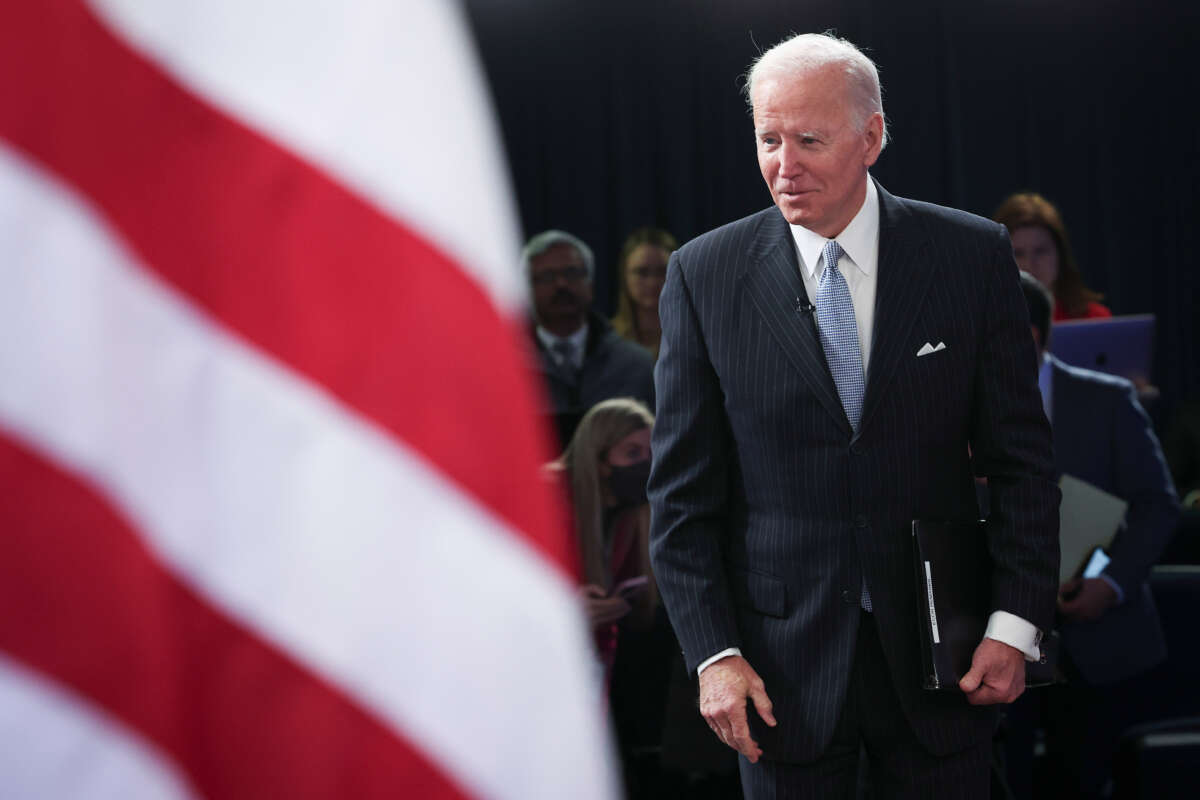Honest, paywall-free news is rare. Please support our boldly independent journalism with a donation of any size.
A group of 20 Democrats and progressives in the Senate are urging President Joe Biden to crack down on federal contractors’ political donations to help reduce “quid pro quo corruption” among federal lawmakers and lobbyists and shine a much-needed light on dark money spending.
In a letter spearheaded by Sen. Sheldon Whitehouse (D-Rhode Island) and signed by 20 senators, including Senators Bernie Sanders (I-Vermont) and Elizabeth Warren (D-Massachusetts), the lawmakers urge Biden to craft an executive order that would require companies that are awarded with a federal contract to disclose their political spending, including dark money donations.
“Citizens United unleashed a flood of unlimited corporate money in our democracy based on the false assumption that the public would be able to see who was behind the spending,” the letter reads. “As we know, that disclosure regime never materialized, but the premise of the decision that anonymous political spending would be corrupting remained. Nevertheless, corrupting ‘dark money’ expenditures exploded.”
The lawmakers say it is undemocratic to allow corporations to spend unlimited amounts of money to influence politics while also being awarded federal contracts.
“This torrent of dark money drowns out voters’ voices. Academic studies show that economic elites and business interests command huge influence on government policy, while regular people have little or none. Politicians elected to federal office with the support of dark money are more likely to support legislation aligned with corporate interests,” the lawmakers wrote. “The White House should not hesitate to cast a bright light on secret political spending and its corrupting effects wherever possible.”
The letter echoes a letter sent by over 60 House members in July, which similarly urged Biden to require federal contractors to disclose political spending.
Dark money donation loopholes allow corporations, including federal contractors, to donate to and influence politicians without having to attach their names to the donations. This means that the extent to which corporations have sway over key decisions like awarding federal contracts — which can often amount to billions of dollars in funding for these companies — is relatively unknown.
This lobbying pays off for corporations. Defense contractors, for instance, regularly spend tens of millions on political donations, and are continually some of the top recipients of the largest contracts given out by the federal government; over half of the hundreds of billions of dollars that Congress and the president authorize for defense each year goes toward contractors, which then translates to massive profits for the corporations.
Such dark money spending grows election cycle after election cycle. Outside spending hit a record high in the 2022 midterm elections, topping $2.1 billion and smashing the previous record set in 2018 of about $1.6 billion. For corporations wishing to, perhaps, ensure that a candidate who they know will be an ally to them has a seat in Congress, election donations also pay off: OpenSecrets found that, of the House races called as of November 10, 96 percent were won by the candidate who spent the most on the race. In their letter, the lawmakers call the phenomenon of corporations helping lawmakers in this way “quid pro quo corruption.”
Democrats and progressives have been trying to fight against the influence of dark money in politics, but have been thwarted by Republicans and corporate Democrats. Whitehouse introduced a bill earlier this year that would require dark money groups to disclose donors who give $10,000 or more during an election cycle, which could expose the political leanings of billionaires, corporations and other deep-pocketed donors. Republicans uniformly voted against the bill in the Senate.
Conservative Democrats like Sens. Joe Manchin (West Virginia) and Kyrsten Sinema (Arizona) also obstructed efforts to uncover and stymie the flow of dark money donors in Democrats’ For the People Act, a sweeping voting rights bill that would, among other things, require dark money groups to disclose donors and empower small donors in elections.
Detractors of Citizens United say that lawmakers should do more to combat the effects of money in politics. Sanders has said that tackling political spending and dark money must be a Democratic priority as American democracy erodes. “We have got to do everything we can to defend American democracy,” Sanders said in an interview last month. “When you’re looking at democracy, it’s not just Trump. It is the Citizens United Supreme Court decision, which has got to be dealt with.”
A terrifying moment. We appeal for your support.
In the last weeks, we have witnessed an authoritarian assault on communities in Minnesota and across the nation.
The need for truthful, grassroots reporting is urgent at this cataclysmic historical moment. Yet, Trump-aligned billionaires and other allies have taken over many legacy media outlets — the culmination of a decades-long campaign to place control of the narrative into the hands of the political right.
We refuse to let Trump’s blatant propaganda machine go unchecked. Untethered to corporate ownership or advertisers, Truthout remains fearless in our reporting and our determination to use journalism as a tool for justice.
But we need your help just to fund our basic expenses. Over 80 percent of Truthout’s funding comes from small individual donations from our community of readers, and over a third of our total budget is supported by recurring monthly donors.
Truthout has launched a fundraiser to add 500 new monthly donors in the next 10 days. Whether you can make a small monthly donation or a larger one-time gift, Truthout only works with your support.
